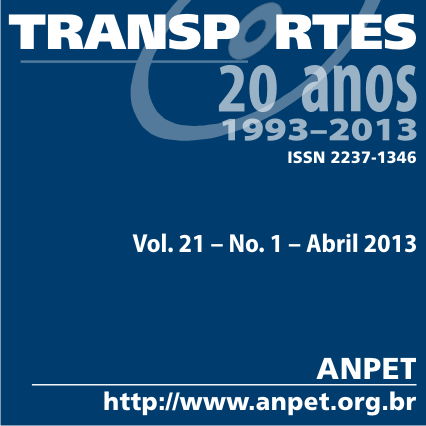Atributos para caracterização de plataformas logísticas: estudo de casos na Espanha, Itália e Dinamarca
DOI:
https://doi.org/10.4237/transportes.v21i1.569Abstract
Plataformas Logísticas são instalações onde diversas empresas executam atividades de transporte, armazenagem, distribuição e produção de mercadorias. As plataformas contribuem para a racionalização dos processos logísticos e podem gerar importantes vantagens competitivas, reduzindo custos e melhorando o nível de serviço das empresas. O objetivo deste estudo é estabelecer os atributos que caracterizam três empreendimentos bem sucedidos com relação a sua implantação e evolução. Através da metodologia de estudo de casos múltiplos foram analisadas duas importantes plataformas logísticas europeias (Plaza em Zaragoza, Espanha e Distrito de Nola, Itália) e um Parque Eco-Industrial (Kalundborg, Dinamarca). Os resultados do estudo contribuem para o entendimento de como estas instalações devem ser implantadas e geridas para alcançar maior eficiência, além de fornecer uma modelo de análise que pode ser aplicado a novos estudos de casos.
Downloads
References
Ballis, A. e G. Mavrotas (2007) Freight Village Design using the multicriteria method Promothee. Operational Research. An International Journal, v.7, n.2. DOI: 10.1007/BF02942388
Bocovis, M.M.C. (2007) Estudo comparativo das plataformas logísticas europeias x brasileiras. II Congresso de Pesquisa e Inovação da Rede Norte Nordeste de Educação Tecnológica João Pessoa, Manaus.
Boile, M.; S. Theofanis e P. Gilbert (2009a) Task 5: analyzing Freight Village opportunities. Feasibility of freight villages in the NYMTC region, disponível em <http://www.nymtc.org/project/freight_planning/frtvillage/FrtVillage_files>. (Acesso em 12/2010).
Boile, M.; S. Theofanis e A. Strauss-Wieder (2009b) Feasibility of Freight Village in the NYMTC Region. Center for Advanced Infrastructure and Transportation.
Boudouin, D. (1996) Logística-Território-Desenvolvimento: O caso europeu. I Seminário Internacional: Logística, Transportes e Desenvolvimento. Ceará, p.105.
Branski, R. M.; C. C. Carvalho e O. F. Lima Jr. (2011) Modelo conceitual de plataforma logística para a Região Metropolitana de Campinas. In XXXI Encontro Nacional de Engenharia de Produção (XXXI ENEGEP). Belo Horizonte.
Brown, A.P. (2010). “Qualitative method and compromise in applied social research”. Qualitative Research, Vol. 10, No 2, pp. 229-248. DOI: 10.1177/1468794109356743
Cambra-Fierro, J. e , R. Ruiz-Benitez (2009) Advantages of intermodal logistics platforms: insights from a Spanish platform. Supply Chain Management: An International Journal, v. 14 Iss: 6 pp. 418 – 42. DOI: 10.1108/13598540910995183
Carvalho, C. C. (2010) Análise de benchmarking para projeto de plataforma logística: caso da plataforma logística de campinas. Dissertação (mestrado). Programa de Pós graduação em Engenharia Civil, Arquitetura e Urbanismo, Universidade Estadual de Campinas, Campinas -SP.
Carvalho, C. C. e O. F Lima Jr. (2010) Análise de benchmark para projeto de plataforma logística. In: XXIV ANPET - Associação Nacional de Ensino e Pesquisa em Transporte, Salvador.
Carvalho, C. C.; M. F. H Carvalho e O. F Lima J (2010) Efficient logistic platform design: the case of Campinas Platform. In: XVI ICIEOM - International Conference on Industrial Engineering and Operations Management 2010, São Carlos. Technological Innovation and Intellectual Property: Production Engineering Challenges in Brazil Consolidation in the World Economic Scenario.
Chertow, M.R. (2007) “Unconvering” industrial symbiosis. Journal of Industrial Ecology, New Haven, v. 1, n. 1, p. 11-30.
Colin, J. (1996) Les evolutions de la logistique en Europe: vers la polarisation des espaces. I Seminário Internacional: Logística, Transportes e Desenvolvimento. Ceará, p. 52-92.
Desrochers, P (1997) Eco-Industrial Parks: The Case for Private Planning. PERC Research Study RS 00-1.
Dias, J.C.Q. (2005) Logística Global e Macrologística. Edições Sílabo, Lisboa, 1 ed.
Duarte, C.J.E. (2005) Distribuição e Logística na União Europeia. Eurotendências. Portugal.
Duarte, P. C. (1999) Modelo para desenvolvimento de Plataforma logística em um terminal: Estudo de Caso na Estação Aduaneira do Interior – Itajaí/SC. Dissertação (mestrado). Programa de Pós-graduação em Engenharia de Produção, Universidade Federalde Santa Catarina - UFSC. Florianópolis- SC.
Duarte, P. C. (2004) Desenvolvimento de um mapa estratégico para apoiar a implantação de uma plataforma logística. Dissertação (doutorado). Programa de Pós-Graduação em Engenharia de Produção. Universidade Federal do Rio Grande do Sul - UFRGS. Porto Alegre.
Dubke, A.F.; F.R.N. Ferreira e N.D Pizzolato (2004) Plataformas Logísticas: características e tendências para o Brasil. XXIV ENEGEP.
Eisenhardt, K.M. (1989) Building theories form case study research. Academy of Management Review. New York, v. 14 n. 4.
European Commission (1997) Intermodality and transport of goods, Brussels. Intermodality and transport of goods. Brussels Beugeum Congress.
Europlatforms EEIG. (2004) Logistics Centres Directions for Use. Disponível em: < www.unece.org > (Acesso em 10/2009).
Gajšek, B., M. Lipičnik e M. Šimenc (2012) The Logistics Platform Disambiguation. Research in Logistic & Production. v. 2, n. 1, pp. 69-80.
Garner, A. e G.A. Keoleian (1999). Industrial ecology: an introduction. Pollution Prevention and Industrial Ecology Disponível em: <http://www.umich.edu/~nppcpub/resources/compendia/INDEpdfs/INDEintro.pdf>. (Acesso em 15/10/2012).
Gertler M.S. (1995) "Being There": Proximity, Organization, and Culture in the Development and Adoption of Advanced Manufacturing Technologies. Economic Geography- Collaboration and Competition in Geographical, v. 71, n. 1, pp. 1-26.
Higgins, C.D. e M.R Ferguson (2011) An Exploration of the Freight Village Concept and its Applicability to Ontario. McMaster Institute of Transportation and Logistics.
Interporto Campanho (2012) Disponível em :<www.terminalintermodalnola.it>. (Acesso em 18/04/2012).
Juga, J. (1996) Organizing for Network Synergy in Logistics: A Case Study. International Journal of Physical Distribution & Logistics Management, v. 26 (2), 51-67. DOI: 10.1108/09600039610113209.
Koch, H.; S. Nestler e T. Nobel (2010) Ranking of European Freight Village locations – benchmarking of the European experiences. DDG: Deutsche GVZ- Gesellschaft mbH.
Lowe, E.A. (2001) Eco-industrial Park Handbook for Asian Developing Countries. A Report to Asian Development Bank, Environment Department, Indigo Development: Oakland, CA.
Martins, T. T. (2006) Considerações sobre Implantação de uma Plataforma Logística no Estado do Rio de Janeiro. Dissertação (mestrado) - Puc-Rio, Rio de Janeiro.
Naslund, D. (2002). Logistics needs qualitative research: especially action research. International Journal of Physical Distribution & Logistics Management. Vol. 32 No. 5, pp. 321-38. DOI: 10.1108/09600030210434143.
Novaes, A. G. N. e E.F. Frazzon (2005) Sustentabilidade e Macro-Logística: Conceituação e Perspectivas. Anais do XIX ANPET, v. II, pp. 1811-1820. XIX Congresso de Pesquisa e Ensino em Transportes, Recife, PE.
Ockwell, A. (2001) Benchmarking the performance of intermodal transport. Report. Division of Transport, Organisation for Economic Co-operation and Development, Paris.
Plaza, Plataforma Logística de Zaragoza (2012) Disponível em: www.plazalogistica.index.aspx. (Acesso em 17/04/2012).
Rodrigues, A.D. (2004) Plataforma Logística: Competitividade e Futuro. Revista Conjuntura Econômica Goiana, p.65.
Rosa, D. (2004) Plataforma logístico-cooperativa: integração horizontal das cadeias de abastecimento. Associação Nacional de Pesquisa e Ensino em transportes: Rio de Janeiro.
Schalarb, M. (2000) Eco-Industrial Developments. Sustainable architecture white papers. Earth Plege Foundation, p. 105-113.
Taminoto A. H. (2004) Proposta de simbiose industrial para minimizar os resíduos sólidos no Pólo Petroquímico de Camaçari. Dissertação (mestrado profissional) em Gerenciamento e Tecnologias Ambientais no Processo Produtivo, Universidade Federal da Bahia - UFBA. Salvador.
Taniguchi E.E e H. Van Der (2000) An evaluation methodology for city logistics. Transport Reviews, v. 20, 65–90.
Watson, N. e S. Kraiselburd (2009) The Logistic Park of Zaragoza. Harvard Business School Publishing, Boston, MA02163.
Weisbrod, E.R., E. Swiger, G. Muller, F.M. Rugg, e M.K. Murphy (2002) Global freight villages: A solution to the urban freight dilemma. Proceedings of the 81st TRB Annual Meeting, Washington.
Yin, R. K. (2003) Case study research, design and methods (applied social research methods). Thousand Oaks. California: Sage Publications.
Downloads
Published
How to Cite
Issue
Section
License
Authors who submit papers for publication by TRANSPORTES agree to the following terms:
- The authors retain the copyright and grant Transportes the right of first publication of the manuscript, without any financial charge, and waive any other remuneration for its publication by ANPET.
- Upon publication by Transportes, the manuscript is automatically licensed under the Creative Commons License CC BY 4.0 license. This license permits the work to be shared with proper attribution to the authors and its original publication in this journal, and to be adapted for non-commercial purposes, provided appropriate credit is given and any derivative works are distributed under the same terms.
- Authors are authorized to enter into additional separate contracts for the non-exclusive distribution of the version of the manuscript published in this journal (e.g., publishing in an institutional repository or as a book chapter), with recognition of the initial publication in this journal, provided that such a contract does not imply an endorsement of the content of the manuscript or the new medium by ANPET.
- Authors are permitted and encouraged to publish and distribute their work online (e.g., in institutional repositories or on their personal websites) after the editorial process is complete. As Transportes provides open access to all published issues, authors are encouraged to use links to the DOI of their article in these cases.
- Authors guarantee that they have obtained the necessary authorization from their employers for the transfer of rights under this agreement, if these employers hold any copyright over the manuscript. Additionally, authors assume all responsibility for any copyright infringements by these employers, releasing ANPET and Transportes from any responsibility in this regard.
- Authors assume full responsibility for the content of the manuscript, including the necessary and appropriate authorizations for the disclosure of collected data and obtained results, releasing ANPET and Transportes from any responsibility in this regard.









